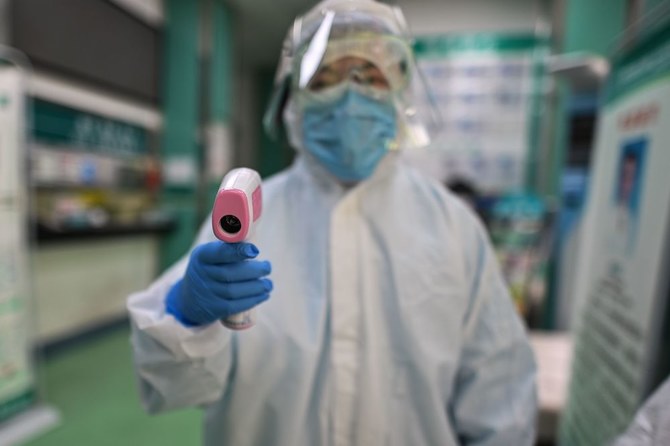NEW YORK: When US President Donald Trump yanked American funding for the World Health Organization (WHO), he did so on the grounds that the organization displayed “a dangerous bias” towards China and had failed to investigate early suspicions of human-to-human transmission of the coronavirus disease (COVID-19) in December 2019.
However, throughout January and February, Trump repeatedly praised China’s efforts to contain the virus. He called Chinese President Xi “strong, sharp and powerfully focused on leading the counterattack to the coronavirus.”
As soon as the first deaths were recorded in the United States, however, Trump changed his tone. During his daily press briefings, he referred to coronavirus as the “Chinese virus,” and persistently blamed the outbreak on the Chinese government’s perceived lack of transparency.
“We have seen this blame game from day one,” Joe Macaron, a Washington DC-based expert in US international relations, told Arab News. “Trump called it the Chinese virus. And Beijing accused the US of fabricating the virus to curb its rise as a global economic power.
“This is expected in an election year. Trump does not want to take direct blame for the growing unemployment, the crash of the market and all the other economic implications of the coronavirus,” Macaron added. “He needs a narrative that says it was not his mistake, that it was something that came from the outside. And China is an easy scapegoat, regardless of what science might say or not.”
-------
READ MORE: Did this Chinese government lab in Wuhan leak the coronavirus?
-------
Trump — and other politicians — constantly blaming China has exacerbated a wave of conspiracy theories, supported even by respected scientists. Some have even suggested coronavirus was intended as a bioterrorist attack.
It has become increasingly difficult to disentangle these theories from serious news reports that the that the virus may have originated in a Chinese lab — not as a bioweapon, but as part of Chinese experiments intended to show the world that China is better equipped than the US in its ability to identify and combat viruses and pandemics.

As the world races to find a cure or a vaccine for COVID-19, demand for greater transparency on the part of China has increased, with many arguing that complete honesty from governments will be crucial in helping to better understand a virus whose characteristics remain largely unknown.
Sourabh Gupta, a specialist in US-China relations at the Institute for China-America Studies in Washington DC, laments the number of conspiracy theories floating around.
“Unfortunately, such theories are a sign of so much anger and anguish in this country, which is leading it to lash out in many directions,” Gupta told Arab News. “That being said, it is fair enough for the CIA to investigate whether the virus originated in a Chinese lab as a bioterror product or due to poor handling of material. But it is wrong (for) senior elected politicians to parade that as a distinct possibility.
“Yes, this could have originated in a lab, but the chances are very low,” Gupta continued.
Dr. Bakhos Tannous, a professor at Harvard Medical School and an expert in cancer and viral infections, told Arab News, “There’s always a question mark (over) whether the virus could have been made in a lab, simply because it’s technically possible to change the structure of the virus. You can do that in a lab.”
But looking at the historical natural evolution of coronaviruses, Tannous said he doubts that coronavirus is a lab product.
“Since the Eighties, (coronavirus) has mutated into seven different strains,” he said. “The virus did not, initially, bind to human cells, (but it took) only two small natural changes for it to be able to jump from an animal to a human being. The virus is smart enough to mutate and use the human cell’s normal issue to survive and replicate itself. So one copy of the virus makes millions of copies inside.
“Why did it change? We don’t know, but this is how evolution typically works. This is how genes change,” Tannous continued. “It’s our bad luck that it happened now.”
Trump has also been cryptically alluding to possible retaliations against China, but has yet to specify what measures, if any, his administration might take against the world’s second-largest economy.
Experts believe his options are limited. “Trump has already taken many punitive measures against China in the trade and technology battle” said Gupta. “And in this pandemic, he is dependent upon Chinese medical supplies. But if he does wish to take action against the Chinese, he can tip the scale in terms of technology denials to China in the context of the trade and technology war.
“While the pandemic has been ongoing, there have been very serious discussions happening on a separate track as to what sort of semi-conductor manufacturing exports the US sends to China should be denied to Beijing,” Gupta continued. “Trump has been trying to keep those denials at the lowest minimum — because he is very open to doing business with China — while more hawkish figures in the administration are pushing for more denials in export controls. That debate is still ongoing and it is at a very high level.”
Tannous believes there are more urgent issues at hand at this time — such as whether Americans should continue to stay at home. He warned that any premature relaxing of shelter-in-place orders and other social-distancing measures will result in a major catastrophe for the country’s healthcare system, which he said simply cannot handle a greater load.




























